新目标八年级下册-英语语法知识点精讲
春人教新目标英语八年级下册Unit1重点知识讲解
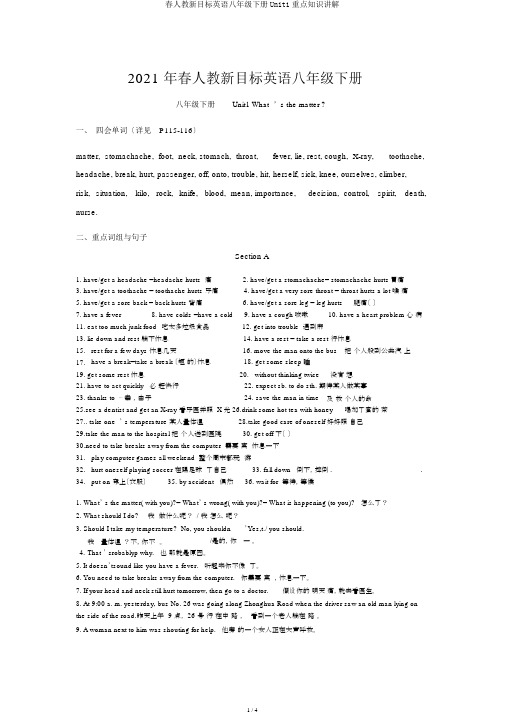
2021 年春人教新目标英语八年级下册八年级下册Unit1 What ’s the matter ?一、四会单词〔详见P115-116〕matter, stomachache, foot, neck, stomach, throat, fever, lie, rest, cough, X-ray,toothache, headache, break, hurt, passenger, off, onto, trouble, hit, herself, sick, knee, ourselves, climber, risk, situation, kilo, rock, knife, blood, mean, importance, decision, control, spirit, death, nurse.二、重点词组与句子Section A1. have/get a headache =headache hurts 痛2. have/get a stomachache= stomachache hurts胃痛3. have/get a toothache = toothache hurts 牙痛4. have/get a very sore throat = throat hurts a lot 喉痛5. have/get a sore back = back hurts 背痛6. have/get a sore leg = leg hurts腿痛〔〕7. have a fever8. have colds =have a cold9. have a cough咳嗽10. have a heart problem 心病11. eat too much junk food吃太多垃圾食品12. get into trouble 遇到麻13. lie down and rest 躺下休息14. have a rest = take a rest行休息15.rest for a few days 休息几天16. move the man onto the bus把个人般到公共汽上17.have a break=take a break 〔短的〕休息18. get some sleep睡19. get some rest 休息20. without thinking twice没有想21. have to act quickly必赶快行22. expect sb. to do sth. 期待某人做某事23. thanks to ⋯幸,由于24. save the man in time及救个人的命25.see a dentist and get an X-ray 看牙医并照 X 光 26.drink some hot tea with honey喝加了蜜的茶27.. take one ’ s temperature某人量体温28.take good care of oneself 好好照自己29.take the man to the hospital 把个人送到医院30. get off 下〔〕30.need to take breaks away from the computer 需要离休息一下31.play computer games all weekend整个周末都玩游32.hurt oneself playing soccer 在踢足球了自己33. fall down 倒下,摔倒 ..34.put on 穿上〔衣服〕35. by accident 偶然36. wait for 等待,等候1. What’ s the matter( with you)?= What’ s wrong( with you)?= What is happening (to you)? 怎么了?2. What should I do?我做什么呢? / 我怎么呢?3. Should I take my temperature? No, you shouldn’Yes,t./ you should.我量体温?不,你不。
英语人教版新目标八年级下册知识整理Unit5

【英语】八年级下册教材全梳理(Unit5 If you go to the party you’ll have a great time)知识·巧学生词巧解【词析】音析:字母组合ea读作[]。
义析:a kind of trousers【典句】This pair of jeans is in style.这条牛仔裤很时髦。
【拓展】jeans本身是复数名词,作主语时谓语动词要用复数形式。
take away拿走【词析】形析:take(拿)+away(离开)义析:take sth.from one place to another【典句】Don’t forget to take away your umbrella.别忘了带走你的雨伞。
【拓展】away是副词,当宾语为代词宾格时,一定要放在away的前面。
make a living 谋生【词析】形析:make(做)+a(一种)+living(生活)义析:do sth.for a living【典句】He makes a living as a writer.他靠写作维持生计。
【拓展】使用时,如果说明谋生的手段应在living后加介词by+doing的结构,指“以……为生”。
如:He makes a living by selling books.他以卖书为生。
【词析】音析:a读[],ai读作[e],重音在第二个音节上。
形析:again(又;再次)+st义析:in a direction or course opposite to【典句】We boated against the wind.我们逆风行船。
【拓展】against本身是介词,不能单独作谓语,常和系动词be连用,意为“反对”。
【词析】音析:ch读作[],an读作[],词尾的e不发音。
形析:形近词change(选择)义析:something that happen unusually and luckily【典句】I haven’t had a chance to read my letter.我还没有机会看我的信呢。
【人教新目标】八年级英语下册《Unit 3》短语及语法讲义
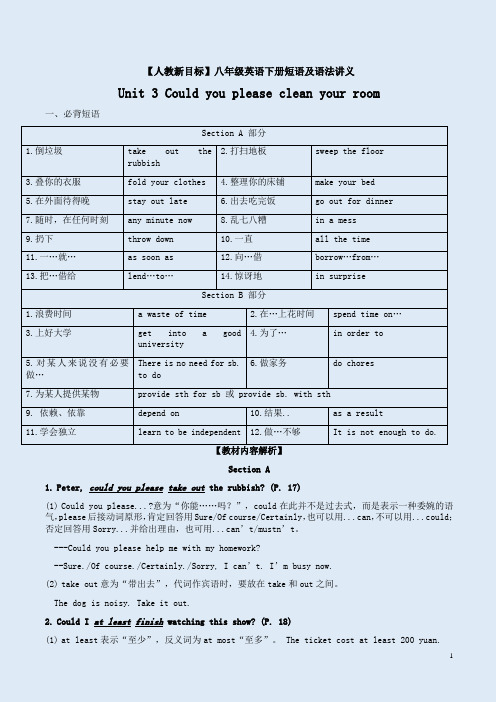
【人教新目标】八年级英语下册短语及语法讲义Unit 3 Could you please clean your room一、必背短语Section A 部分1.倒垃圾take out therubbish2.打扫地板sweep the floor3.叠你的衣服fold your clothes4.整理你的床铺make your bed5.在外面待得晚stay out late6.出去吃完饭go out for dinner7.随时,在任何时刻any minute now8.乱七八糟in a mess9.扔下throw down 10.一直all the time11.一…就…as soon as 12.向…借borrow…from…13.把…借给lend…to…14.惊讶地in surpriseSection B 部分1.浪费时间 a waste of time2.在…上花时间spend time on…3.上好大学get into a gooduniversity4.为了…in order to5.对某人来说没有必要做…There is no need for sb.to do6.做家务do chores7.为某人提供某物provide sth for sb 或 provide sb. with sth9. 依赖、依靠depend on 10.结果.. as a result11.学会独立learn to be independent 12.做…不够It is not enough to do.【教材内容解析】Section A1.Peter, could you please take out the rubbish? (P. 17)(1)Could you please...?意为“你能……吗?”,could在此并不是过去式,而是表示一种委婉的语气,please后接动词原形,肯定回答用Sure/Of course/Certainly,也可以用...can,不可以用...could;否定回答用Sorry...并给出理由,也可用...can’t/mustn’t。
新目标英语八年级下册Unit1Willpeoplehaverobots知识点
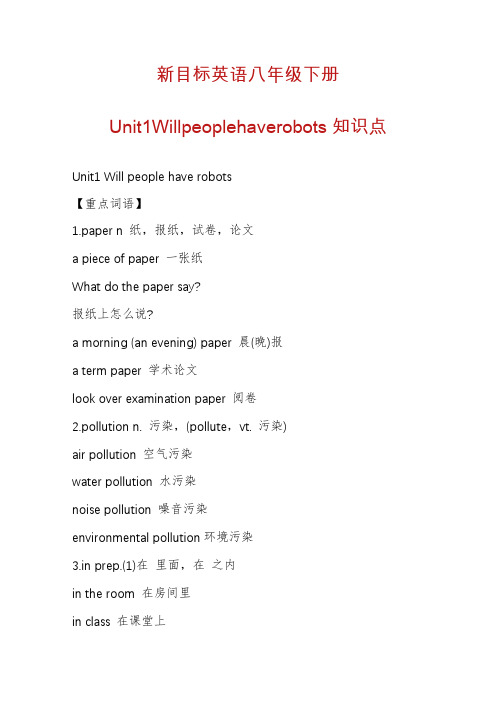
新目标英语八年级下册Unit1Willpeoplehaverobots知识点Unit1 Will people have robots【重点词语】1.paper n 纸,报纸,试卷,论文a piece of paper 一张纸What do the paper say?报纸上怎么说?a morning (an evening) paper 晨(晚)报a term paper 学术论文look over examination paper 阅卷2.pollution n. 污染,(pollute,vt. 污染)air pollution 空气污染water pollution 水污染noise pollution 噪音污染environmental pollution环境污染3.in prep.(1)在里面,在之内in the room 在房间里in class 在课堂上(2)在(某段时间)之间in the morning 在早上in the past 在过去I′ll come back in a day or two我过一两天就会回来in,after,later 接时间段,都可表示“(一段时间)之后”,它们有什么区别呢?①“in+一段时间”指“(将来的)一段时间之后”。
What will you be in five years?五年之后你干什么?We’ll start off in ten minutes.我们十分钟后出发。
②“after+一段时间”或“一段时间+later”表示“(在过去某个时间看来)一段时间之后”。
He went home after two days.他两天后回家了。
Three years later,she had a baby.三年后,她生了一个婴儿。
4.less adj. 较少的;少量的(little的比较级)They buy less beer and fewer cigarettes now现在他们买的啤酒和香烟比以前少了。
人教新目标英语八年级下册讲义—Unit 9 Have you ever been to a ……

新目标八年级下册Unit 9 Have you ever been to a museum ?讲义一、重点单词1. amusement n. 娱乐; 游戏2. somewhere adv. 在某处; 到某处3. camera n. 照相机; 摄影机; 摄像机4. invention n. 发明物5. invent v. 发明; 创造1. unbelievable adj. 难以置信的; 不真实的2. progress n. 进步; 进展3. rapid adj. 迅速的; 快速的4. unusual adj. 特别的; 不寻常的5. toilet n. 坐便器; 厕所6. encourage v. 鼓励7. social adj. 社会的8. peaceful adj. 和平的; 安宁的9. performance n. 表演; 演出10. perfect adj. 完美的; 完全的11. itself pron.(it的反身代词) 它自己12. collect v. 收集; 采集13. German adj. 德国的; 德语的; 德国人的n. 德语; 德国人14. theme n. 主题15. ride n. 供乘骑的游乐设施; 短途旅程16. province n. 省份17. simply adv. 仅仅; 只; 不过18. fear v. & n. 害怕; 惧怕19. whether conj. 不管......;还是); 或者......(或者); 是否20. Indian adj.印度的 n. 印度人21. Japanese adj.;日本的; 日本人的; 日语的n. 日本人; 日语22. equator n. 赤道23. whenever conj. 在任何......时候; 无论何时24. spring n. 春天25. mostly adv. 主要地; 通常26. location n. 地点; 位置二、短语归纳1.at night在夜晚2.in a more natural environment在一个更加自然的环境中3.all year round 全年4.be far from 离……远5.in the dark 在黑暗中6.in the past 在过去7.have been to sp. 去过某地8.science museum 科学博物馆9.history museum 历史博物馆10.amusement park 游乐园11.go somewhere different 去不同的地方12.go skating 去滑冰13.take the subway 坐地铁14.a great way to spend a Saturday afternoon一个过周六下午的好方法15.all the old movie cameras所有的古老的电影摄影机16.learn about sth.解有关……的情况17.on the weekend 在周末18.camp in the mountains 在大山里露营19.put up a tent搭帐篷20.in such a rapid way 以如此迅猛的方式21.different kinds of各种各样的22.development of toilets 厕所的发展23.social groups 社会团体24.the tea art performances茶艺表演25.make a perfect cup of tea with beautiful tea sets用漂亮的茶具沏一杯完美的茶26.a nice place to enjoy tea 一个品茶的好地方27.thousands of 数以千计的28.International Museum of Toilets国际厕所博物馆29.the Terracotta Army 兵马俑30.Southeast Asia东南亚31.Night Safari 夜间动物园32.three quarters 四分之三33.an English-speaking country一个讲英语的国家34.have problem doing sth. 做某事很困难35.during the daytime在白天36.a couple of times 好几次37.right now 现在;目前38.an amusement park with a special theme一个有特别的主题的游乐园39.walk around the park 在公园里到处走40.hear of 听说41.take a ride兜风42.another province另一个省43.the Bird’s Nest鸟巢44.encourage sb. to do sth.鼓励某人做某事45.on the one hand... on the other hand.一方面,另一方面三、句型集萃1.a great way to do sth一个做某事的好办法2.It’s unbelievable that很难相信……3.watch sb do sth.看某人做了某事4.encourage sb to do sth鼓励某人做某事5.as..as和。
(人教新目标)八年级英语(下)短语语法知识点汇总Unit9
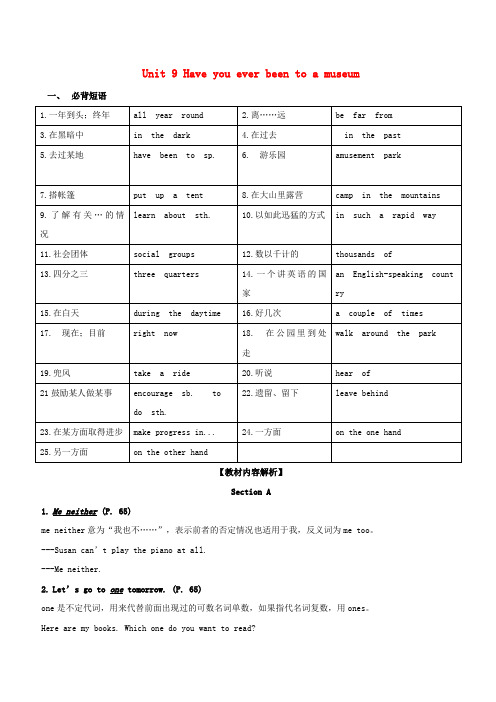
Unit 9 Have you ever been to a museum 一、必背短语【教材内容解析】Section A1.Me neither (P. 65)me neither意为“我也不……”,表示前者的否定情况也适用于我,反义词为me too。
---Susan can’t play the piano at all.---Me neither.2.Let’s go to one tomorrow. (P. 65)one是不定代词,用来代替前面出现过的可数名词单数,如果指代名词复数,用ones。
Here are my books. Which one do you want to read?---I don’t like these dresses.---How about those ones over there.3.Let’s go somewhere different today. (P. 65)somewhere用作副词,表示“在某处、到某处”,常用于肯定句中,在否定句和疑问句中用anywhere。
It’s cold here. Let’s go somewhere else.Did you go anywhere last Sunday?4.They are going to take the subway. (P. 66)take the subway意为“乘地铁”,take用作动词,可以表示“乘、坐(车、船等)”。
We take the subway to work every day.5.It’s a great way to spend a Saturday afternoon. (P. 66)(1) way表示“方法”时,后常接动词不定式或者of doing作定语。
Can you think out a way to open the door/of opening the door?(2) spend的用法① sb. spend+时间/金钱+on sth. “在某事上花费多长时间或者多少钱”The man spent the whole day on his speech.The family spent 10,000 dollars on their trip.② sb. spend+时间+(in) doing sth. “花费多长时间做某事”The boy has spent two hours playing the computer games.【拓展】辨析spend, pay, take和cost6.We put up a tent and cooked outside. (P. 66)put up意为“搭建”,还可以表示“举起、张贴”。
新目标八年级下册英语各单元重点语法汇总

新目标八年级下册英语各单元重点语法汇总一. 询问健康及麻烦的表达方法1. 常用结构:What’s the matter (with sb.)?(sb.)怎么了?What’s wrong (with sb.)?(sb.)怎么了?What’s the trouble with sb? sb.出什么事了?What happened to sb? sb.发生了什么事?Are you OK? 你没事吧?Is there anything wrong with sb.?sb.有不舒服/麻烦吗?2. 要表达身体疼痛或不舒服,可用以下结构:①sb. have/has 病症The twins have colds.双胞胎感冒了。
②sb.have/has a headache/toothache/stomachache/backache. She had a stomachache last night. 她昨晚肚子痛。
③sb. have/has a sore 发病部位He has a sore throat. 他喉咙痛。
④sb. hurt(s) 身体部位或反身代词He hurt his leg. 他的腿受伤了。
⑤某部位hurt(s).My head hurts badly. 我头痛得厉害。
⑥sb. have/has a pain in one’s 身体部位I have a pain in my chest. 我胸口痛。
⑦(There is) something wrong with one’s 身体部位There is something wrong with my right eye. 我的右眼有毛病。
⑧其他表达方式She has a heart trouble. 她有心脏病。
He got hit on the head. 他头部受到了撞击。
She cut her finger. 她割破手指了。
二.情态动词should1. should为情态动词,意为“应该;应当”,否定式为shouldn’t,其后接动词原形,无人称和数的变化。
人教新目标八年级英语语法复习:复合不定代词

复合不定代词
• 复合不定代词是由some-,any-,no-,every-加上-one, -body,-thing所组成的不定代词。复合不定代词包括: someone(某人)somebody(某人)something(某事 物)somewhere(某地)anyone(任何人)anybody(任 何人)anything(任何事物)anywhere(任何地方)no one(没人)nobody(没人)nothing(没事物)nowhere (没有地方)everyone(每个人)everybody(每个人) everything(一切事物)everywhere(一切地方),共十 六个。
•
* After the strong wind every flower in the garden was gone.
•
* Every time I ring you up, your mother answers it.
•
* I shall do my best to help you in every way. (我将尽用一切办法帮助
复合不定代词
• b. each的意思是“每个;各自的”,可以指人,也可以 指物。如:
• * I leave home at 7 a.m. each day.
• * On each floor there are about twenty classrooms.
• * Each of them has received a letter. • 由于each和every的意思相近,都表示“每一个”,因此
•
A. are B. is C. be D. were
总结
2020年春人教新目标英语八年级下册Unit7知识点归纳总结
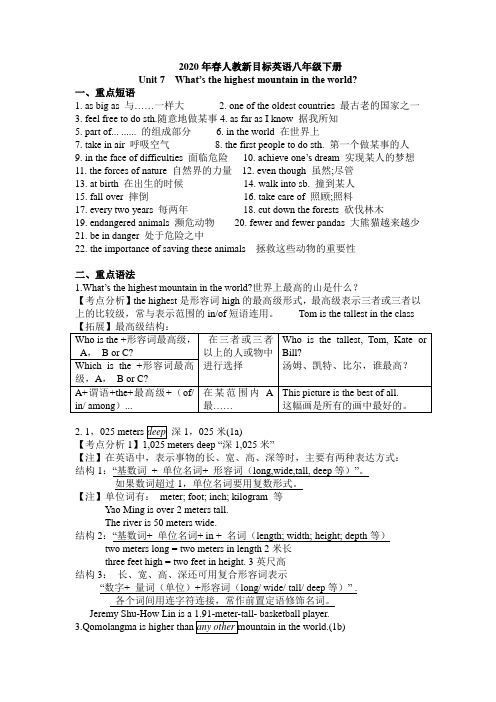
2020年春人教新目标英语八年级下册Unit 7 What’s the highest mountain in the world?一、重点短语1. as big as 与……一样大2. one of the oldest countries 最古老的国家之一3. feel free to do sth.随意地做某事4. as far as I know 据我所知5. part of... ...... 的组成部分6. in the world 在世界上7. take in air 呼吸空气 8. the first people to do sth. 第一个做某事的人9. in the face of difficulties 面临危险 10. achieve one’s dream 实现某人的梦想11. the forces of nature 自然界的力量 12. even though 虽然;尽管13. at birth 在出生的时候 14. walk into sb. 撞到某人15. fall over 摔倒 16. take care of 照顾;照料17. every two years 每两年 18. cut down the forests 砍伐林木19. endangered animals 濒危动物 20. fewer and fewer pandas 大熊猫越来越少21. be in danger 处于危险之中22. the importance of saving these animals 拯救这些动物的重要性二、重点语法1.What’s the highest mountain in the world?世界上最高的山是什么?【考点分析】the highest 是形容词high 的最高级形式,最高级表示三者或三者以上的比较级,常与表示范围的in/of 短语连用。
Tom is the tallest in the class2. 1,深1,025米(1a)【考点分析1】深1,025米”【注】在英语中,表示事物的长、宽、高、深等时,主要有两种表达方式:结构1:“基数词 + 单位名词+ 形容词(long,wide,tall, deep 等)”。
人教版八年级下册各单元英语语法解析知识重点总结

新目标英语八年级(下)重点短语及句型总Unit 1 Will people have robots?1. fewer people 更少的人(fewer 修饰名词复数,表示否定)2. less free time 更少的空闲时间(less 修饰不可数名词,表示否定)3. in ten years 10年后(in 的时间短语用于将来时,提问用 How soon)4. fall in love with … 爱上……例:When I met Mr. Xu for the first time, I fell inlove with him at once.当我第一次见到许老师,我立刻爱上他。
5. live alone 单独居住6. feel lonely 感到孤独(比较:live alone/ go alone 等)The girl walked alone along the street, but shedidn't feel lonely.那女孩独自沿着街道走,但她并不感到孤独。
7. keep/ feed a pet pig 养一头宠物猪8. fly to the moon 飞上月球9. hundreds of + 复数数百/几百(概数,类似还有 thousands of;millions of)10. the same as 和……相同11. A be different from B A与B不同(= There is a difference/ Thgere aredifferences between A and B)12. wake up 醒来(wake sb. up 表示“唤醒某人”)13. get bored 变得厌倦(get/ become 是连系动词,后跟形容词如 tired/angry/ excited 等)14. go skating 去滑冰(类似还有 go hiking/ fishing /skating/ bike riding 等)15. lots of/ a lot of 许多(修饰可数名词、不可数名词都可以)16. at the weekends 在周末17. study at home on computers 在家通过电脑学习18. agree with sb. 同意某人(的意见)19. I don't agree. = I disagree. 我不同意。
八年级英语新目标下Uint1语法辅导

八年级英语新目标下Uint1语法辅导八年级英语新目标下Uint1语法辅导重点语法Unit 1 ill peple have rbts?1 语法要点(1)用ill表示一般将时:一般将时通常表示将要发生的动作或存在的状态。
一般将时由“助动词ill/shall+动词原形”表示。
一般将时的肯定句、疑问句和否定句形式表示如下(以g为例):一般将时的用法:A 表示将要发生的行为动作或存在的状态。
常与表示将的时间状语连用:trr, next ee, next nth, in a fe das, fr n n等。
例如:I’ll be there in half an hur我将在半个小时内到那儿。
I’ging t visit the useu this Sunda这个星期天我将去参观博物馆。
B 句子中没有时间状语提示动作发生的时间,可以通过上下判断其谓语动词是发生在将。
例如:I dn’t n h ill d it我不知道谁将做这事。
Dn’t rr, he ill be there n tie不要担心,他会准时到达那儿的。
表示将经常发生的动作。
例如:Fr n n, I ill get up earl ever da从现在开始,我将每天早起。
I ill ften g t see u next ear我明年会经常去看你的。
注意:表示将要发生的动作或存在的状态,除了用上述的表示方法外,还可以用:“a/ is / are ging t+动词原形”表示。
“a/ is/ are ging t+动词原形”这个结构的用法如下:A be ging t+动词原形表示”意图”,即打算、计划要做某事。
例如:Are u ging t pst the letter?你要去寄这封信吗?H lng is he ging t sta here?他将在这儿住多长时间?B be ging t+动词原形还可以表示“预见”,即现在已有迹象表明将要发生的事。
2020年春人教新目标英语八年级下册 Unit1 单元知识点总结全解
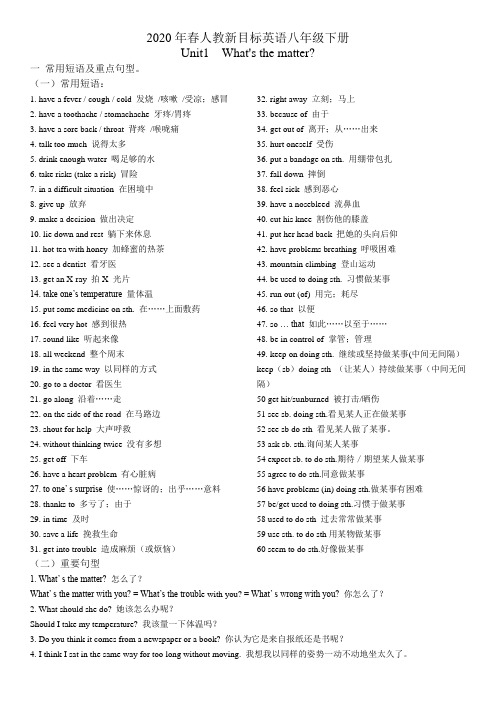
2020年春人教新目标英语八年级下册Unit1 What's the matter?一常用短语及重点句型。
(一)常用短语:1. have a fever / cough / cold 发烧/咳嗽/受凉;感冒2. have a toothache / stomachache 牙疼/胃疼3. have a sore back / throat 背疼/喉咙痛4. talk too much 说得太多5. drink enough water 喝足够的水6. take risks (take a risk) 冒险7. in a difficult situation 在困境中8. give up 放弃9. make a decision 做出决定10. lie down and rest 躺下来休息11. hot tea with honey 加蜂蜜的热茶12. see a dentist 看牙医13. get an X-ray 拍X 光片14. take one’s temperature 量体温15. put some medicine on sth. 在……上面敷药16. feel very hot 感到很热17. sound like 听起来像18. all weekend 整个周末19. in the same way 以同样的方式20. go to a doctor 看医生21. go along 沿着……走22. on the side of the road 在马路边23. shout for help 大声呼救24. without thinking twice 没有多想25. get off 下车26. have a heart problem 有心脏病27. to one’ s surprise 使……惊讶的;出乎……意料28. thanks to 多亏了;由于29. in time 及时30. save a life 挽救生命31. get into trouble 造成麻烦(或烦恼)32. right away 立刻;马上33. because of 由于34. get out of 离开;从……出来35. hurt oneself 受伤36. put a bandage on sth. 用绷带包扎37. fall down 摔倒38. feel sick 感到恶心39. have a nosebleed 流鼻血40. cut his knee 割伤他的膝盖41. put her head back 把她的头向后仰42. have problems breathing 呼吸困难43. mountain climbing 登山运动44. be used to doing sth. 习惯做某事45. run out (of) 用完;耗尽46. so that 以便47. so … that 如此……以至于……48. be in control of 掌管;管理49. keep on doing sth. 继续或坚持做某事(中间无间隔)keep(sb)doing sth (让某人)持续做某事(中间无间隔)50 get hit/sunburned 被打击/晒伤51 see sb. doing sth.看见某人正在做某事52 see sb do sth 看见某人做了某事。
人教版新目标八年级下册1-5单元_英语语法知识点精讲+练习.docx

Peter told me he _____
(be)bored yesterday.
3.
She said she _____(go)swimming last Sunday.
4.
Bobby said he _____
(may)call me later.
5.
Antonio told me he _____
(have)a party.
3.
When I _____(come)into the classroom, she ________ ______
(read)a storybook.
4.
She _____ ______(play)computer games while her mother ____ ______
(Mike)
4. I’m having a surprise party for Lana.
(she)
(五)if引 的条件状 从句
构:if+一般 在 ,主 +将来
含 :如果⋯⋯,将要⋯⋯
例如:If you ask him, he will help you.
如果你 求他,他会帮助你。
Ifneed be, we’ll work all night.
答案:1. should 2. shouldn’t3. should 4. should 5. should(三) 去 行
去 行 表示 去某一点 正在 行的 作或者 去某一段 内一直 行的 作。
1.构成
was /were + doing,例如:
I was watchingTV at 9 o’clock last night.
(cook)yesterday
人教新目标八年级英语下册Unit 2 知识点总结
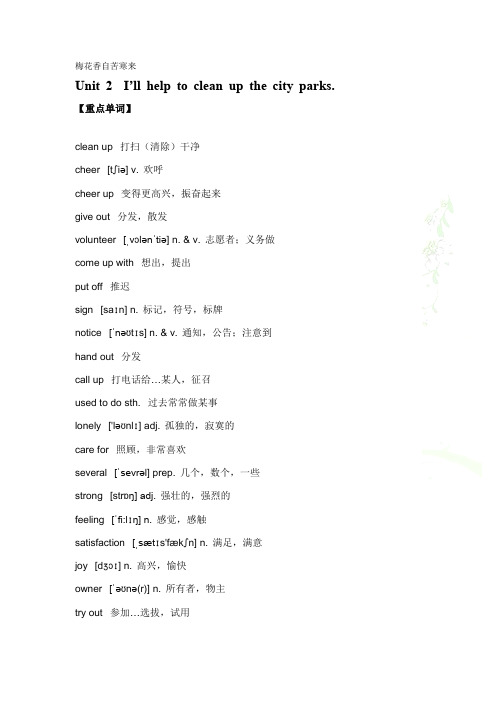
梅花香自苦寒来Unit 2 I’ll help to clean up the city parks.【重点单词】clean up 打扫(清除)干净cheer [tʃiə] v. 欢呼cheer up 变得更高兴,振奋起来give out 分发,散发volunteer [ˌvɔlənˈtiə] n. & v. 志愿者;义务做come up with 想出,提出put off 推迟sign [saɪn] n. 标记,符号,标牌notice [ˈnəʊtɪs] n. & v. 通知,公告;注意到hand out 分发call up 打电话给…某人,征召used to do sth. 过去常常做某事lonely ['ləʊnlɪ] adj. 孤独的,寂寞的care for 照顾,非常喜欢several [ˈsevrəl] prep. 几个,数个,一些strong [strɒŋ] adj. 强壮的,强烈的feeling [ˈfi:lɪŋ] n. 感觉,感触satisfaction [ˌsætɪs'fækʃn] n. 满足,满意joy [dʒɔɪ] n. 高兴,愉快owner [ˈəʊnə(r)] n. 所有者,物主try out 参加…选拔,试用journey ['dʒɜ:nɪ] n. (尤指长途)旅行,行程raise [reɪz] v. 抬起,举起,筹集,征集alone [əˈləun] adv. 独自地,孤独地repair [riˈpɛə] v. 修理,修补fix [fiks] v. 修理,安装fix up 修理,修补give away 赠送,捐赠take after (外貌或行为)像broken ['brəʊkən] adj. 破损的,残缺的wheel [wi:l] n. & v. 轮子,车轮;旋转letter [ˈletə] n. 信件,字母Miss [mɪs] n. 小姐set up 建立,设立disabled [disˈeibəld] adj. 有残疾的,丧失能力的make a difference 影响,有作用blind [blaɪnd] adj. 盲的,盲目的,失明的deaf [def] adj. 聋的imagine [ɪˈmædʒɪn] v. 想象,设想difficulty ['dɪfɪkəltɪ] n. 困难open [ˈəʊpən] v. 打开door [dɔ:] n. 门carry ['kærɪ] v. 携带,搬运train [treɪn] v. 训练,培养training [ˈtreɪnɪŋ] n. 训练,培训excited [ɪkˈsaɪtɪd] adj. 激动的,兴奋的kindness [ˈkaɪndnəs] n. 仁慈,善良,亲切,善意clever [ˈklevə] adj. 聪明的,机灵的understand [ˌʌndəˈstænd] v. 懂,理解change [tʃeɪndʒ] n. & v. 改变interest ['ɪntrəst] n. & v. 感兴趣;兴趣sir [sɜ:(r)] n. 先生madam ['mædəm] n. 夫人,女士【重点短语】1.Clean-Up Day 清洁日2. an old people’s home 养老院3. help out with sth. 帮助解决困难4. used to 过去常常......5. care for 关心;照顾6. the look of joy 快乐的表情7. at the age of 在......岁时8.clean up 打扫(或清除)干净9. cheer up (使)变得更高兴;振奋10. give out 分发;散发11. come up with 想出;提出12. make a plan 制订计划13. make some notices 做些公告牌14. try out 试用;试行15. work for 为…工作;为…. 效力16. put up 建造;举起;张贴17. hand out 分发;散发;发给18. call up 打电话;召集19. put off 推迟;延迟20. for example 比如;例如21. raise money 筹钱;募捐22. take after 与......相像;像23. give away 赠送;捐赠24. fix up 修理;修补;解决25. be similar to 与……相似26. set up 建立;设立27. disabled people 残疾人28. make a difference 影响;有作用29. be able to 能够30. after-school reading program 课外阅读项目【重点句型】1. The boy could give out food at the food bank. 这个男孩可以在食品救济站分发食物。
人教版八年级下册英语语法解析总结

新目标英语八年级(下)重点语法句型总结Unit 1 Will people have robots?本单元语法讲解:一般将来时1. 表示将要发生的动作或存在的状态。
本时态标志词:①含tomorrow; next 短语;②in + 段时间;③how soon;④by + 将来时间;⑤by the time sb. do …;⑥祈使句句型中:or/and sb. will do;⑦在时间/条件状语从句中,如果从句用一般现在时,主句用将来时;⑧another day比较be going to 与will:be going to 表示近期、眼下就要发生的事情,will 表示的将来时间则较远一些。
如:He is going to write a letter tonight. He willwrite a book one day.2. be going to 表示根据主观判断将来肯定发生的事情,will表示客观上将来势必发生的事情。
He is seriously ill. He is going to die. Hewill be twenty years old.3. be going to 含有“计划,准备”的意思,而will 则没有这个意思,如:She is going to lend us her book. He will behere in half an hour.4. 在有条件从句的主句中,一般不用be going to, 而多用will。
如:If any beasts comes at you, I'll stay with you and help you.掌握了它们的这些不同,你就能很好的区分be going to 与will 了。
一般将来时常见的标志词①含tomorrow; next 短语;②in + 段时间;③how soon;④by + 将来时间;5. 祈使句句型中:or/ and sb. will do例:Be quick, or you will be late = If you don't be quick, you will be late6. 在时间/条件状语从句中,如果从句用一般现在时,主句用将来时Unit 2 What should I do?本单元目标句型:1. What's wrong (with you)?/ What's the matter?2. What should I do? 我该怎么办?3. You could write him a letter. 你可以给他写封信。
八年级下册英语语法总结加例句

新目标英语八年级下复习资料总结:第4组◆unit 1 Will people have robots?知识点:1.形容词,副词的比较等级考查热点透视:a) 表示A与B在程度上相同时,“as+形容词或副词的原级+as”结构。
表示A不如B 时,可用“not as/so+形容词或副词的原级+as”结构。
b) 表示A比B在程度上“更…..”时,可用“形容词或副词的比较级+than”结构c) 表示三者或三者以上的比较,其中一个在程度上“最…..”时,常用“the+形容词或副词的最高级”结构,后面可带“of/in的短语”来说明比较的范围。
(注意:副词的最高级在句中常省略“the”.)d) 在形容词或副词的比较级前,可以用“a little, even, far, much,still”的等词语来修饰,以加强语气。
e) 表示“越来越….”时,常用“形容词或副词的比较级+and+形容词或副词的比较级”结构,但要注意,对于多音节和部分双音节形容词,副词而言,若要表达此意时,要用“more and more+形容词或副词的原级“结构。
f) 在表示“其中最….之一“的含义时,常使用“one of+the+形容词最高级形式+名词复数”结构,其中的定冠词the不可以省略。
g) 如果强调“两者中比较…的(一个)”的意思时,可使用“the+形容词比较级+其它”结构。
h) 表示“越….越….”, 可使用“the+形容词或副词的比较级,the+形容词或副词的比较级”结构。
2 .一般将来时a) 一般将来时的构成:由助动词shall或will加动词原形构成,shall用于第一人称。
在口语中,will在名词或代词后常简略为’ll,will not常简略为won’t。
这个时态的肯定,否定和疑问结构可表示如下:肯定句否定句疑问句I (We)shall(will) go.You(He, She, They) will go. I(We)shall(will) not go.You(He, She, They)will not go. Shall I(we) go?Will you (he, she, they) go?用”be going to +动词原形”也可表示将来时,表示将要发生的事,打算或决定要做的事。
新目标八年级下英语语法提纲

新目标八年级下英语语法提纲1.一般将来时的三种基本结构:⑴will +V.⑵be going to +V.⑶be + Ving一般将来时的时间状语:in + 时间,in the future,next + 时间,与tomorrow 相关的时间,this + 时间,from now on,right now,some day…2.形容词、副词的比较级用法3.情态动词情态动词没有人称和数的变化;情态动词不能直接做谓语,必须和一个动词原形同时使用;大多数情态动词没有时态的变化;情态动词加上be,通常表示猜测的语气。
4.过去进行时⑴用法:表示在过去某一时刻或某段时间内正在进行的动作。
⑵谓语结构:be ( was, were )+ Ving⑶时间状语:at that time/momentat + 点钟+ yesterday/last nightfrom +点钟+ to +点钟+ yesterdaythis time yesterdayjust thenwhen he came in, ….(when引导的时间状语从句是过去时,并且动词是短暂性动词时,主句使用过去进行时)5.when & whilewhen与while都是从属连词,都有“当……时”的意思。
when 可与一个点的时间或表示一段的时间连用,从句动词可以是短暂性或延续性动词;while 只指一段时间,不能指一点时间。
因此while从句中的谓语动词必须是延续性动词。
6.宾语从句⑴引导词:that ——引导陈述句,在句中可省略;if,whether ——引导一般疑问句,可相互替换(从句中出现or not时只能使用whether);wh-,h- ——引导特殊疑问句。
注意:从句讲述的是客观真理时,不根据主句改变时态。
⑶语序:引导词后加陈述句语序“主句+ 引导词+ 从句主语+ 从句谓语+ 其他”7.直接引语和间接引语直接引语变为间接引语时参照宾语从句的变法,把双引号内的句子变为宾语从句即可。
新目标英语八年级下学期语法要点总复习

中学生英语【语法1】现在完成时【考例】①Thanks to (由于)the teachers,I have (catch)up w ith my classmates.(用所给单词的适当形式填空)(2005南京)②Since 2000,Nanchang has beco me a new city.Every thing .(2005江西)A.is changedB.w as changedC.has changedD.had changed ③Dav id Shanghai fo r more than three months.(2004辽宁)A.came toB.has been toC.has been inD.has come to ④China has the WTO fo r some years.(2005四川南充课改区)A.take part inB.joinedC.been a member of【解析】①填caught 。
②选C 。
③选C 。
④选C 。
现在完成时由“助动词have /has +动词的过去分词”构成。
表示过去发生或已经完成的动作对现在造成的影响或结果,如考例①。
现在完成时也可表示过去已经开始,持续到现在的动作或状态,如考例②。
若现在完成时态的句子含有for ,since 等词引出的表示一段时间的状语时,谓语动词必须用延续性动词。
常见的终止性动词及其对应的延续性动词有:come →be,join →be a member o f,leave →be aw ay ,buy →have,borrow →keep,open →be o pen 等。
【语法2】现在完成进行时【考例】用所给动词的适当形式填空。
①Linda (change)a lot since she entered Harv ard Univ ersity.(2003江西)②Mr.Green is an engineer.He(w ork)in China fo r about tw o years.(2004辽宁大连)【解析】①填has been changing /has changed 。
- 1、下载文档前请自行甄别文档内容的完整性,平台不提供额外的编辑、内容补充、找答案等附加服务。
- 2、"仅部分预览"的文档,不可在线预览部分如存在完整性等问题,可反馈申请退款(可完整预览的文档不适用该条件!)。
- 3、如文档侵犯您的权益,请联系客服反馈,我们会尽快为您处理(人工客服工作时间:9:00-18:30)。
新目标八年级下册英语语法知识点精讲+练习Unit1一般将来时一般将来时表示将来某个时间要发生的动作或者存在的状态。
通常与表示将来的时间状语连用,如tomorrow, the day after tomorrow, next year, next month, next week, in 100 years等。
be going to do(动词原形)结构:表示打算、准备做的事情或者肯定要发生的事情。
如:It is going to rain.will do结构表示将来的用法:1. 表示预见Do you think it will rain?You will feel better after a good rest.2. 表示意图I will borrow a book from our school library tomorrow.What will she do tomorrow?基本构成如下:一般疑问句构成:(1)will+主语+do…? Will Sarah come to visit me next Sunday?(2)there be 结构的一般疑问句:Will there + be …?Will there be fewer trees? Yes, there will. / No, there won’t否定句构成:will + not (won’t)+doSarah won’t come to visit me next Sunday.特殊疑问句构成:特殊疑问词+will+主语+…?What will Sarah do next Sunday?★★练一练★★根据例句,用will改写下列各句例:I don’t feel well today. (be better tomorrow)I’ll be better tomorrow.1. Gina has six classes today. (have a lot of homework tonight)_____________________________2. I’m tired now. (sleep later)_____________________________3. My parents need a new car. (buy one soon)_____________________________4. We can’t leave right now. (leave a little later)_____________________________5. The weather is awful today. (be better tomorrow)_____________________________答案:1. She’ll have a lot of homework tonight.2. I’ll sleep later.3. They’ll buy one soon.4. We’ll leave a little later.5. Maybe it’ll be better tomorrow.Unit2 should的用法:should用来提出建议和忠告,后边加动词原形,否定句直接在should后边加not.eg:I think you should eat less junk food.我认为你应该少吃垃圾食品。
She drives a lot and she seldom walks. So I think she should walk a lot.她经常开车,很少走路。
所以我认为她应该多走路。
Students shouldn’t spend too much t ime playing computer games.学生们不应当花太多的时间玩计算机游戏。
学习向别人提建议的几种句式:(1)I think you should…(2)Well, you could…(3)Maybe you should …(4)Why don’t you…? =why not do、、、?(5)What about doing sth.?(6)You’d better do sth.★★练一练★★用should或shouldn’t填空1. I can’t sleep the night before exams.You ______ take a warm shower before you go to bed.2. Good friends ______ argue each other.3. There is little milk in the glass. We _______ buy some.4. They didn’t invite you? Maybe you ______ be friendlier.5. I am a little bit overweight. So I think I _______ do exercises every day.Unit3 过去进行时(一)过去进行时的构成及用法:1、构成:主语+was / were + 动词的现在分词(其中am,is—was; are—were )2、用法:表示在过去某一时间内正在进行的动作或状态.也可用来表示过去一段时间内持续发生的动作。
(常与过去进行时连用的时间状语有:then,this time yesterday,at that time,at 9:00 yesterday evening, the whole morning,all night等)The barber was cutting my hair at that time.we were sleeping at 8:00 yesterday morning.She was writing a letter the whole morning.((二)when和while引导的时间状语从句。
意思是“当、、、、时”when 是at that time的意思,表示做某种动作的时间或瞬间。
其谓语动词可以是延续性的,也可以是非延续性的,常与一般现在时或一般过去时连用。
eg:When winter comes, the weather gets colder and colder.When Linda saw Davy, he was playing basketball.I was reading a book when she came into my room。
When he was a child he was always trying out new ideas.while是during the time的意思,表示略长的一段时间。
其谓语动词必须是延续性的。
常与现在进行时或过去进行时连用。
Eg:Tom was reading a newspaper while he was waiting for a bus.I am doing my homework while my mother is cooking.★★练一练★★用括号中所给动词的适当形式填空。
1. This time yesterday I ____ ______(read)books.2. At 9 o’clock last Sunday they ______ ______(have)a party.3. When I _____(come)into the classroom, she ________ ______(read)a storybook.4. She _____ ______(play)computer games while her mother ____ ______(cook)yesterday afternoon.5. I _____ ______(have)a shower when you _______(call)me yesterday.Unit4 宾语从句★★练一练★★根据中文提示,完成句子。
1. 如果你参加聚会,你将会过得很开心。
If you ________ the party, you __________.2. 如果明天下雨,我们将不去野餐。
If it __________ tomorrow, we ___________.Ⅰ.单项选择。
1. If you _____ to the party, you’ll have a great time.A. will goB. wentC. goD. going2. I ____ her the answer if she ____me.A. can tell, will askB. will tell, will askC. would tell, askD. will tell, asks3. – What are you going to do tomorrow? --We’ll go to the library tomorrow if it ___.A. isn’t rainB. rainC. won’t rainD. doesn’t rain5. I’ll give the book to him if he ___ here nex t Sunday.A. will comeB. comesC. is comingD. came7. Must we clean the house now? No, you _______.A. needn'tB. may notC. mustn'tD. can't1. I _____ to the cinema. I ______ there every Sunday.A. go…goB. am going… goC. go… am goingD. am going…am going2. Look, they______ a good time, ____ they ?A. have…doB. have…don'tC. are having…areD. are having… aren't3. ______ a sports meet last Sunday ? Yes, they ______.A. Did they have... did B. Did they have... had C. Had they... had D. Had they (i)4. This time yesterday Jack _____ his, bike. He _____ TV.A. repaired… didn't watchB. was repairing… watchedC. repaired… watchedD. was repairing… wasn't watching。
